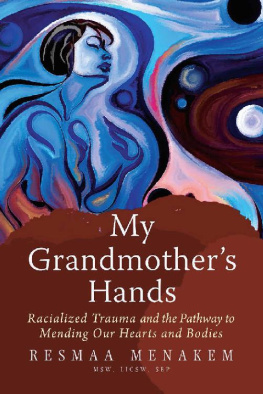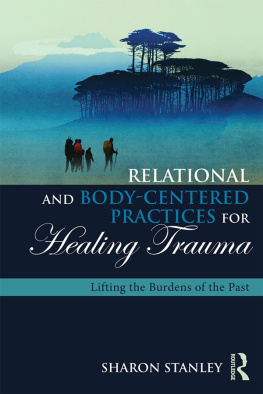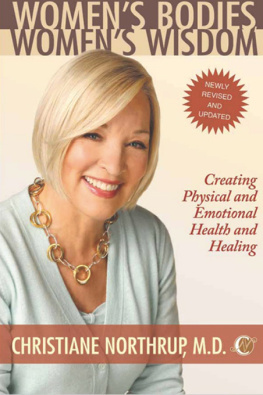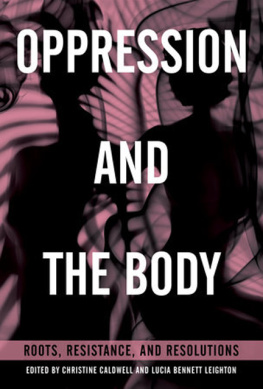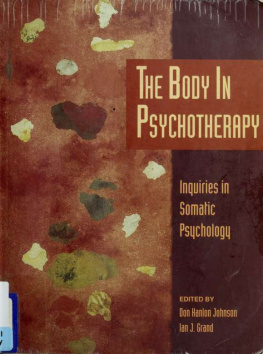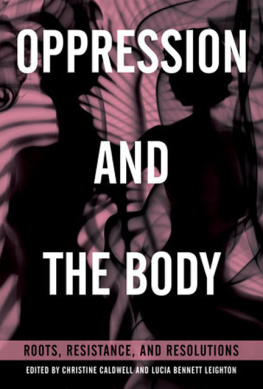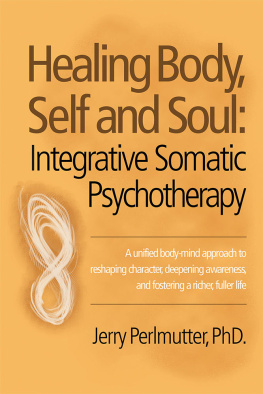ABOUT THE BOOK
A habitual movement as common as nail-biting or toe-tapping can be the key to pulling out addictive behavior by its roots. These unconscious movement tags indicate the places where our bodies have become split off from our psyches. When brought to consciousness and confronted they will often tell us very plainly where our psychological suffering originated, showing us where to begin reconnecting body and soul. Christine Caldwell, a pioneer in the field of somatic psychology, has created an original model for working with body wisdom called the Moving Cycle. She describes how this form of therapy has worked effectively in her own practice, and she provides practical techniques to show how we can learn to listen to what our bodies are telling us, confront addictive habits, and learn to celebrate our inherent wisdom and elegance.
CHRISTINE CALDWELL, Ph.D., is a somatic therapist in private practice in Boulder, Colorado. She is the founder of the Somatic Psychology Department at the Naropa Institute and the director of the Moving Center, also in Boulder.
Sign up to learn more about our books and receive special offers from Shambhala Publications.

Or visit us online to sign up at shambhala.com/eshambhala.
Getting Our Bodies Back
Recovery, Healing, and Transformation through Body-Centered Psychotherapy
Christine Caldwell
Foreword by Gay and Kathlyn Hendricks

Shambahala Boston & London 2013
Shambhala Publications, Inc.
Horticultural Hall
300 Massachusetts Avenue
Boston, Massachusetts 02115
www.shambhala.com
1996 by Christine Caldwell
Foreword 1996 by Gay and Kathlyn Hendricks
The excerpt from the poem from Dream Work by Mary Oliver, is used by permission of Grove/Atlantic, Inc. Copyright 1986 by Mary Oliver.
All rights reserved. No part of this book may be reproduced in any form or by any means, electronic or mechanical, including photocopying, recording, or by any information storage and retrieval system, without permission in writing from the publisher.
Library of Congress Cataloging-in-Publication Data
Caldwell, Christine, 1952
Getting our bodies back: recovery, healing, and transformation through body-centered psychotherapy / Christine Caldwell; foreword by Gay and Kathlyn Hendricks.
p. cm.
Includes bibliographical references
eISBN 978-0-8348-2619-9
ISBN 978-1-57062-149-9 (alk. paper)
1. Compulsive behaviorTreatment. 2. Substance abuseTreatment.
3. Mind and body therapies. I. Hendricks, Kathlyn. II. Title.
RC533.C34 1996 95-41225
616.86 0651dc20 CIP
To my parents,
Jim and Lucille Caldwell
To my teachers
Allegra Fuller Snyder
Judith Aston
Thich Nhat Hanh
To my friends
Sophie Darbonne
Gay and Katie Hendricks
David Silver
Jayne Satter
Jack Haggerty
Contents
With Getting Our Bodies Back, the addictions/recovery field has grown a healthy body. We have observed Christines development of the Moving Cycle over many years and celebrate the emergence of her book. This accessible and magically sensible approach springs directly from thousands of hours of witnessing people claim their full aliveness. This is the first comprehensive method that truly honors the intelligence and innate healing capacity of the whole body-mind. Christine lays out a map of this territory that is easy to follow and electrifying to use.
Christine founded and developed the somatic psychology program at Naropa Institute, where many of the strategies and practices described in this book were studied and refined. This program is one of the few places where students learn to utilize the power of deep witnessing and to follow the organic movement process while developing a rich inner life. One of Christines great gifts is the skill of forming random events into comprehensible categories. The web she weaves from the seeming chaos of body phenomena is a breakthrough in treatment that will refresh and renew practitioners and curious people from many professions.
Getting Our Bodies Back is a guided tour of what Moshe Feldenkrais calls the elusive obvious. It shows you how to befriend the disowned body you live in and move into wholeness.
The whole field of psychology needs this book and the wealth of healing it offers. Christine, in this book as in her life, is generous with herself, sharing her discoveries with transparency and humor. We predict this work will be required reading for anyone who wants to be truly effective and have a heart-centered humorous healing journey.
GAY AND KATHLYN HENDRICKS
Discovering the Source
When we are embodied, we become learners.
RICHARD STROZZI HECKLER, The Anatomy of Change
Some years ago after a spectacular binge, I finally grumped and whined my way into admitting I had an addictive relationship to sugar. I had all the typical signs: hiding it, sneaking it, being out of control with it, lying about it. A short while after this confession, on a trip to the local mall, I bought a large cookie to share with my four-year-old son. As we settled down to eat, my attention was drawn to him as he murmured contentedly, munched noisily, and consumed his half with delighted joy. I inhaled my half with obsessive greed, worrying about how fattening it was and wondering if anyone I knew was watching. The contrast in our experiences, given that it was the same cookie, shook me. I felt a stab in my heart as I realized that somewhere along the line I had lost the happy relationship with cookies that he still had. The difference between us in that moment seemed to be that he was awake and alive, while I was shut down and withdrawn.
I vowed to myself that from that moment on I would let myself eat as much sugar as I wanted, but only when I could stay awake and truly celebrate the experience as much as my son had. My previous bouts with abstinence had left me feeling deprived, empty, anxious, and just as addicted as ever. I longed to practice what I saw in my sona physical aliveness and centeredness in the present that seemed to elude me when it came to sugarwhether I was actually eating it or not. What I subsequently discovered was that it was almost impossible for me to do this. At the first sweet bite I would enter a state of oblivion, eat quickly and furtively, and then feel miserable. In short, I was not awake and alive, and this was not a pleasurable experience. It felt more like a driven experience, with the same familiar outcome of self-absorption and self-hatred.
As I stuck with my commitment to eat sugar only when I could remain present, I occasionally stayed conscious for a few seconds at a time as I nibbled, and I began to explore this awakeness. In those brief moments, I could see the cookie; I could luxuriate in its smell and texture; I could savor the taste and truly treasure it. I was actually having a rich sensory experience, albeit a fleeting one. I was amazed to realize that I derived immense pleasure more from the act of staying awake than from the actual eating of the cookie. Sensation was wonderful! And as I continued to stay awake, I found that I didnt really want much sugar. The experience of eating it while awake was so rich and full that a very small amount was all it took to satisfy me. If I monitored the pleasure, it began to taper off quickly. If I stopped at that point, the taste of joy lingered in my mouth. If I continued to eat, I began to feel slightly sick. I found myself eating much less and enjoying it much more. A little bit of something sweet once in a while was enough to occasion great happiness. And my body told me when to stop. This in itself, this feeling that my body was choosing, making a clear yes or no statement, was quite amazing. When I stayed awake in my body, I could feel the harmful effects of eating more than a bite or two. I could feel my blood sugar shift as I sensed the subtle signs in my bodya slight sweatiness, a higher heart rate, and a sick feeling in my stomach. I actually began to feel the difference between toxins and nourishers in my bodynot just with sugar, but increasingly with all foods. I hadnt expected my body to wake up as a part of this process, and stumbling onto this result was astonishing. What I was discovering was the incredible power of self-regulation that is our birthright. This choosing power had been lost in the throes of the addiction.
Next page


